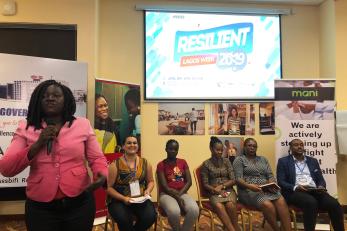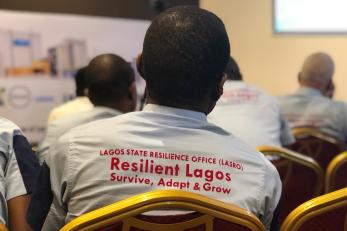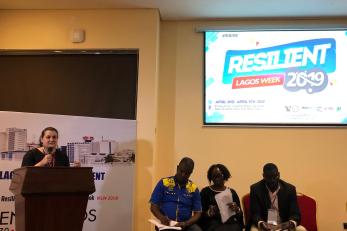Why we focus on youth, the 50% to build resilience in Lagos

Nigeria is urbanizing at an alarming rate and more than 80% of that increase will occur in cities, especially slums.
Lagos, Nigeria’s biggest city, is expanding by an astonishing 80 people every hour and is projected to becoming the sixth most populous city in the world and second largest in Africa by 2050. More than 50% of the population in Lagos is under 25 and their role in building sustainable and resilient urban communities is of significant importance, owing to their sheer size. It is clear that the future of Lagos, like of so many other rapidly urbanizing cities, will increasingly depend on what is done to address youths’ risks and the broader urban issues that threaten their health, livelihoods and future success.
But Lagos is not prepared for this urban explosion. Mercy Corps Nigeria’s recent Urban Strategic Resilience Assessment (STRESS) highlights that the majority of young Lagosians lack meaningful job prospects and live in informal settlements vulnerable to flood events and evictions that often cause homelessness and economic upheaval. Youth unemployment is contributing to high levels of crime, drug abuse, mental health and exposure to violence which has significant negative protection effects, particularly on young women.

So how can we ensure that young people can thrive in a rapidly urbanizing city like Lagos?
Our Mercy Corps Nigeria team tried to answer this question at the Resilient Lagos Week 2019 (RLW) in April, where we hosted a panel discussion titled “Resilient Youth - Resilient Lagos”. Drawing from Mercy Corps’ urban resilience experience in Asia and our Lagos STRESS findings, we focused our discussions on the various shocks and stresses that young Lagosians face and how to maximize efforts around investments that will help them sustain economic, mental and social well-being. The RLW was a unique opportunity for stakeholders from all sectors to collaborate, learn and share insights on how to build the resilience of Future Lagos. It was hosted by Lagos state Government, Water Aid, Heinrich Boll Foundation and Rockefeller Foundation, in partnership with Mercy Corps and Spaces for Change.

Here are four key takeaways:
Strengthen social connections for resilience
While no one feels totally prepared for a shock or stress, our Mercy Corps studies have shown that people who are most connected within a local network fare better in an emergency. A young person’s social network can also be one of the most crucial factors in determining the likelihood of engaging in violence. Community participation can provide young people with alternative models to violence, gangs, and drug abuse ultimately increasing their positive participation in society.
Embrace informality
Nearly all of the shocks and stresses we identified in our assessment disproportionately affect young Lagosians operating in the informal sector or who find themselves living in informal settlements. Cities that take these communities into account fare much better than those who just ignore the fact that they exist and that they are there to grow. Taking steps to integrate informal and unplanned residential, economic, and other areas into the formal planning and development processes will have huge benefits across Lagos.
Seize the opportunity
Lagos can be resilient if it harnesses the potential of its rising youth population by channeling large numbers of unemployed youth into productive activities and away from violence and crime. This can be done by strengthening businesses so that they are more resilient to risks and therefore more equipped to employ youth and/or create jobs that are adapted to a rapidly urbanizing city like Lagos and that take into account some of the major risks that vulnerable communities are facing.
Engage youth in urban policies
Urban regulations and policies need to be reflective of the realities affecting young people. Government and key decision makers should listen to youth, recognize them as key stakeholders in the city and put them at the center of discussions – because when Lagos designs its city with, and for, the most marginalized youth, everyone benefits.